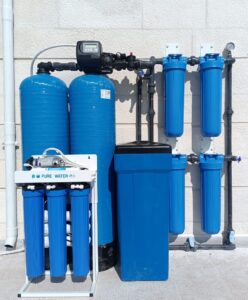
Water is essential for life, but not all water is created equal. Depending on your location, the water that flows through your pipes can vary significantly in its mineral content. One common issue many face is hard water, which contains high levels of minerals like calcium and magnesium. While these minerals aren’t harmful to drink, they can have noticeable effects on your hair, skin, nails, and overall health. This is where a water softener can make a significant difference.
Understanding Water Softeners
Water softeners are devices designed to remove minerals like calcium and magnesium from hard water. Hard water can cause scaling in pipes and appliances, reduce soap effectiveness, and leave residue on dishes and fixtures. The water softening process involves ion exchange, where calcium and magnesium ions are replaced with sodium or potassium ions, resulting in softened water that is gentler on skin, reduces scale buildup, and improves soap lathering. Regular maintenance and occasional replenishment of the softening agents are required to ensure optimal performance. Water softeners are a popular solution in areas with hard water, providing households with improved water quality for various uses.
Understanding Hard Water.
Hard water isn’t typically harmful to your health when consumed, but its effects on external parts of the body can be detrimental. The high mineral content can leave behind residue on surfaces and interfere with the effectiveness of soaps and detergents.
Benefiting Your Hair.
When you wash your hair with hard water, the minerals can leave a residue that makes your hair feel dry, brittle, and difficult to manage. Over time, this can lead to a buildup that dulls the hair’s natural shine. With a water softener, however, the water is treated to remove these minerals, leaving your hair softer, shinier, and easier to style. Soft water also helps shampoos and conditioners lather better and rinse out more completely, ensuring that your hair gets thoroughly clean without any residual buildup.
Benefiting Your Skin.
Hard water can be particularly harsh on the skin. It often leads to dryness and irritation because the minerals can strip away the skin’s natural oils and disrupt its pH balance. This can exacerbate conditions like eczema and dermatitis. By using softened water, you can help maintain your skin’s natural moisture barrier, leading to softer, smoother skin that is less prone to irritation, dryness, and acne.
Benefiting Your Nails.
Just as with hair and skin, hard water can also affect your nails. It can make nails brittle and more prone to breakage. Softened water can help keep nails stronger and healthier by preventing the drying effects of mineral deposits.
Benefiting Your Overall Health.
Beyond hair, skin, and nails, there are broader health benefits associated with using a water softener. Softened water is gentler on clothing and linens, helping them last longer and feel softer against your skin. Additionally, because soap and detergent work more effectively in soft water, you can use less of these products, which can be beneficial for those with sensitive skin or allergies to certain chemicals.
Conclusion.
Investing in a water softener isn’t just about improving the quality of your water—it’s about enhancing your overall well-being. By reducing the harsh effects of hard water on your hair, skin, nails, and clothing, you can enjoy a cleaner, more comfortable living environment. Whether you’re looking to improve the texture of your hair, alleviate skin irritation, or simply enjoy the benefits of softer fabrics, a water softener offers a practical solution that can positively impact your daily life.
